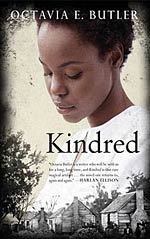
![]() JDowds
JDowds
5/23/2013
![]()
There's a certain humor that comes with SF, no matter how much we'd like to deny it. Murder... IN SPACE. Religion... IN SPACE. Nazis... IN SPACE. Like heavy metal music, the genre of SF/F can be inspiring and can ask a lot of questions about what it means to be a human, but there's also a sense of hilarity to it.
Not so in Kindred. This book is called Science Fiction, but it isn't filed under SF and even the author said she thought it more of a "grim fantasy." The only thing that makes this SF is the time traveling, and the time traveling isn't ever explained.
Kindred is a simple story, at least in concept. A black woman living in modern day Los Angeles (by modern, I mean 1976) with her white husband, is sent back in time - against her own will - to antebellum south, at a plantation where some of her ancestors are located.
In terms of plot and story structure, this novel obeys all the rules. There's a gradual increase of tension, character arcs, and some clear plot points.
But Kindred is so much more than that. Here's a disclaimer. I'm a young white man. I came from a moderately wealthy family, went to a good school, and have a decent job. I'm of Irish descent. The closest thing I experience to prejudice is an episode of Family Guy, and that doesn't count.
We read books in school, written by African Americans, so we can understand just how terrible slavery was. We learn how that stain of racism has carried over into today's society, and how awful that is. Problem is, I'll never truly understand it. Sure, I know it was horrible and a true crime. But I'll never get how it feels to be another person's property, or how it feels to be degraded in such a way, and to have no rights whatsoever.
Kindred, I think, does a great job of portraying this feeling. Though I can't fully understand slavery, by sending a modern black woman back in time, we can at least get some sort of perspective thanks to the time difference.
We see just how someone goes from having everything to nothing, and how she deals with the shame and anger.
Not once do we see the MC wonder at how quickly she let herself become a slave. Yes, she wants to be free, but she also needs to survive. That's a key theme in this book: freedom vs. survival. Yes, you could run away. You could take your whole family and just walk right off the plantation. But you'd probably be caught.
And then you'd be beaten to within an inch of your life. Then you'd be sold to separate plantations, and you'd never see your family again. So what's more important? Your skin or your pride? Your family or your freedom?
There's no easy answer. There never will be.
This novel is important, but it's not fun. That's not a con. A novel about slavery shouldn't be entertaining. It is well-written and well-told. I recommend this book to everyone.